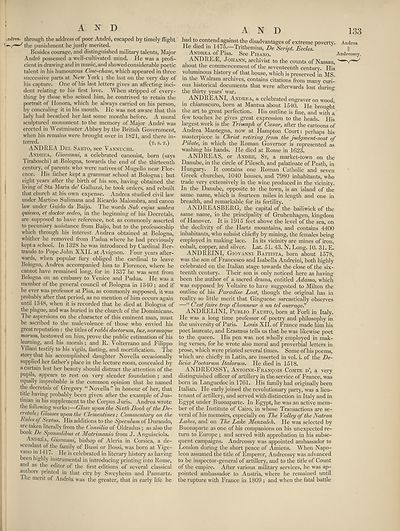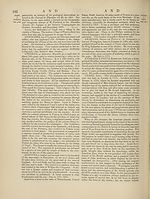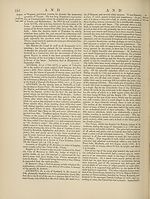Encyclopaedia Britannica > Volume 3, Anatomy-Astronomy
(141) Page 133
Download files
Complete book:
Individual page:
Thumbnail gallery: Grid view | List view

i
AND
.ndrea. through the address of poor Andre, escaped by timely flight
the punishment he justly merited.
Besides courage, and distinguished military talents, Major
Andre possessed a well-cultivated mind. He was a profi¬
cient in drawing and in music, and showed considerable poetic
talent in his humourous Cow-chase, which appeared in three
successive parts at New York ; the last on the very day of
his capture. One of his last letters gives an affecting inci¬
dent relating to his first love. When stripped of every¬
thing by those who seized him, he contrived to retain the
portrait of Honora, which he always carried on his person,
by concealing it in his mouth. He was not aware that this
lady had breathed her last some months before. A mural
sculptured monument to the memory of Major Andre was
erected in Westminster Abbey by the British Government,
when his remains were brought over in 1821, and there in¬
terred. (t. s. t.)
ANDREA Del Sarto, see Vannuchi.
Andrea, Giovanni, a celebrated canonist, born (says
Tiraboschi) at Bologna, towards the end of the thirteenth
century, of parents who were natives of Mugello near Flor¬
ence. His father kept a grammar school at Bologna; but
eight years after the birth of his son, having obtained the
living of Sta Maria de’ Galluzzi, he took orders, and rebuilt
that church at his own expense. Andrea studied civil law
under Martino Sulimans and Ricardo Malombra, and canon
law under Guido da Baijo. The words Sub cujus umbra
quiesco, et doctor sedeo, in the beginning of his Decretals,
are supposed to have reference, not as commonly asserted
to pecuniary assistance from Baijo, but to the professorship
which through his interest Andrea obtained at Bologna,
whither he removed from Padua where he had previously
kept a school. In 1328 he was introduced by Cardinal Ber-
trando to Pope John XXH. at Avignon. Four years after¬
wards, when popular fury obliged the cardinal to leave
Bologna, Andrea accompanied him to Florence, where he
cannot have remained long, for in 1337 he was sent from
Bologna on an embassy to Venice and Padua. He was a
member of the general council of Bologna in 1340 ; and if
he ever was professor at Pisa, as commonly supposed, it was
probably after that period, as no mention of him occurs again
until 1348, when it is recorded that he died at Bologna of
the plague, and was buried in the church of the Dominicans.
Ihe aspersions on the character of this eminent man, must
be ascribed to the malevolence of those who envied his
great reputation : the titles of rabbi doctorum, lux, normaque
morum, bestowed on him, prove the public estimation of his
learning, and his morals; and R. Volterrano and Filippo
Villani testify to his vigils, fasting, and mortification. The
story that his accomplished daughter Novella occasionally
supplied her father’s place in the lecture room, concealed by
a curtain lest her beauty should distract the attention of the
pupils, appears to rest on very slender foundation ; and
equally improbable is the common opinion that he named
the decretals of Gregory “Novella” in honour of her, that
title having probably been given after the example of Jus¬
tinian in his supplement to the Corpus Juris. Andrea wrote
the following works:—Gloss upon the Sixth Booh of the De¬
cretals; Glosses upon the Clementines; Commentary on the
Rules of Sextus. His additions to the Speculum of Durando,
aie taken literally from the (Jonsilia of Oldradus ; as also the
book De Sponsalibus et Matrimonio from J. Anguisciola.
Andrea, Giovanni, bishop of Aleria in Corsica, a de¬
scendant of die family of Bussi or Bossi, was born at Vige-
vano in 1417. He is celebrated in literary history as having
been highly instrumental in introducing printing into Rome,
and as the editor of the first editions of several classical
authors printed in that city by Svveyheim and Pannartz.
1 lie merit of Andrea was the greater, that in early life he
AND
133
had to contend against the disadvantages of extreme poverty. Andrea
He died in 1475. Trithemius, De Script. Eccles. 11
Andrea of Pisa. See Pisano. Andreossy.
ANDREAl, Johann, archivist to the counts of Nassau, 7
about the commencement of the seventeenth century. His
voluminous history of that house, which is preserved in MS
m the Walram archives, contains citations from many curi¬
ous historical documents that were afterwards lost during
the thirty years’ war. h
ANDREANI, Andrea, a celebrated engraver on wood,
in chiaroscuro, born at Mantua about 1540. He brought
the art to great perfection. His outline is fine, and with a
few touches he gives great expression to the heads. His
largest work is the Triumph of Ccesar, after the cartoons of
Andrea Mantegna, now at Hampton Court: perhaps his
masterpiece is Christ retiring from the judgment-seat of
Pilate, in which the Roman Governor is represented as
washing his hands. He died at Rome in 1623.
ANDREAS, or Andre, St, a market-town on the
Danube, in the circle of Pilesch, and palatinate of Pesth, in
Hungary. It contains one Roman Catholic and seven
Greek churches, 1040 houses, and 7980 inhabitants, who
trade very extensively in the wine produced in the vicinity.
In the Danube, opposite to the town, is an island of the
same name, which is fourteen miles in length and one in
breadth, and remarkable for its fertility.
ANDREASBERG, the capital of the bailiwick of the
same name, in the principality of Grubenhagen, kingdom
of Hanover. It is 1915 feet above the level of the sea, on
the declivity of the Hartz mountains, and contains 4400
inhabitants, who subsist chiefly by mining, the females being
employed in making lace. In its vicinity are mines of iron,
cobalt, copper, and silver. Eat. 51. 43. N. Long. 10. 31. E.
ANDREINI, Giovanni Battista, born about 1578,
was the son of Francesco and Isabella Andreini, both highly
celebrated on the Italian stage towards the close of the six¬
teenth century. Their son is only noticed here as having
been the author of a sacred drama, entitled Adamo, which
was supposed by Voltaire to have suggested to Milton the
outline of his Paradise Lost, though the original has in
reality so little merit that Ginguene sarcastically observes
—“ C’estfaire trop d'honneur d un tel ouvrage”
ANDRELINI, Publio Fausto, born at Forli in Italy.
He was a long time professor of poetry and philosophy in
the university of Paris. Louis XII. of France made him his
poet laureate, and Erasmus tells us that he was likewise poet
to the queen. His pen was not wholly employed in mak¬
ing verses, for he wrote also moral and proverbial letters in
prose, which were printed several times. Some of his poems,
which are chiefly in Latin, are inserted in vol. i. of the De-
licice Poetarum Italorum. He died in 1518.
ANDREOSSY, Antoine-Fran^ois Comte d’, a very
distinguished officer of artillery in the service of France, was
born in Languedoc in 1761. His family had originally been
Italian. He early joined the revolutionary party, was a lieu¬
tenant of artillery, and served with distinction in Italy and in
Egypt under Buonaparte. In Egypt, he was an active mem¬
ber of the Institute of Cairo, in whose Transactions are se¬
veral of his memoirs, especially on The Valley of the Natron
Lakes, and on The Lake Menzaleh. He was selected by
Buonaparte as one of his companions on his unexpected re¬
turn to Europe ; and served with approbation in his subse¬
quent campaigns. Andreossy was appointed ambassador to
London during the short peace of Amiens. When Napo¬
leon assumed the title of Emperor, Andreossy was advanced
to be inspector-general of artillery, and to the title of Count
of the empire. After various military services, he was ap¬
pointed ambassador to Austria, where he remained until
the rupture with France in 1809 ; and when the fatal battle
AND
.ndrea. through the address of poor Andre, escaped by timely flight
the punishment he justly merited.
Besides courage, and distinguished military talents, Major
Andre possessed a well-cultivated mind. He was a profi¬
cient in drawing and in music, and showed considerable poetic
talent in his humourous Cow-chase, which appeared in three
successive parts at New York ; the last on the very day of
his capture. One of his last letters gives an affecting inci¬
dent relating to his first love. When stripped of every¬
thing by those who seized him, he contrived to retain the
portrait of Honora, which he always carried on his person,
by concealing it in his mouth. He was not aware that this
lady had breathed her last some months before. A mural
sculptured monument to the memory of Major Andre was
erected in Westminster Abbey by the British Government,
when his remains were brought over in 1821, and there in¬
terred. (t. s. t.)
ANDREA Del Sarto, see Vannuchi.
Andrea, Giovanni, a celebrated canonist, born (says
Tiraboschi) at Bologna, towards the end of the thirteenth
century, of parents who were natives of Mugello near Flor¬
ence. His father kept a grammar school at Bologna; but
eight years after the birth of his son, having obtained the
living of Sta Maria de’ Galluzzi, he took orders, and rebuilt
that church at his own expense. Andrea studied civil law
under Martino Sulimans and Ricardo Malombra, and canon
law under Guido da Baijo. The words Sub cujus umbra
quiesco, et doctor sedeo, in the beginning of his Decretals,
are supposed to have reference, not as commonly asserted
to pecuniary assistance from Baijo, but to the professorship
which through his interest Andrea obtained at Bologna,
whither he removed from Padua where he had previously
kept a school. In 1328 he was introduced by Cardinal Ber-
trando to Pope John XXH. at Avignon. Four years after¬
wards, when popular fury obliged the cardinal to leave
Bologna, Andrea accompanied him to Florence, where he
cannot have remained long, for in 1337 he was sent from
Bologna on an embassy to Venice and Padua. He was a
member of the general council of Bologna in 1340 ; and if
he ever was professor at Pisa, as commonly supposed, it was
probably after that period, as no mention of him occurs again
until 1348, when it is recorded that he died at Bologna of
the plague, and was buried in the church of the Dominicans.
Ihe aspersions on the character of this eminent man, must
be ascribed to the malevolence of those who envied his
great reputation : the titles of rabbi doctorum, lux, normaque
morum, bestowed on him, prove the public estimation of his
learning, and his morals; and R. Volterrano and Filippo
Villani testify to his vigils, fasting, and mortification. The
story that his accomplished daughter Novella occasionally
supplied her father’s place in the lecture room, concealed by
a curtain lest her beauty should distract the attention of the
pupils, appears to rest on very slender foundation ; and
equally improbable is the common opinion that he named
the decretals of Gregory “Novella” in honour of her, that
title having probably been given after the example of Jus¬
tinian in his supplement to the Corpus Juris. Andrea wrote
the following works:—Gloss upon the Sixth Booh of the De¬
cretals; Glosses upon the Clementines; Commentary on the
Rules of Sextus. His additions to the Speculum of Durando,
aie taken literally from the (Jonsilia of Oldradus ; as also the
book De Sponsalibus et Matrimonio from J. Anguisciola.
Andrea, Giovanni, bishop of Aleria in Corsica, a de¬
scendant of die family of Bussi or Bossi, was born at Vige-
vano in 1417. He is celebrated in literary history as having
been highly instrumental in introducing printing into Rome,
and as the editor of the first editions of several classical
authors printed in that city by Svveyheim and Pannartz.
1 lie merit of Andrea was the greater, that in early life he
AND
133
had to contend against the disadvantages of extreme poverty. Andrea
He died in 1475. Trithemius, De Script. Eccles. 11
Andrea of Pisa. See Pisano. Andreossy.
ANDREAl, Johann, archivist to the counts of Nassau, 7
about the commencement of the seventeenth century. His
voluminous history of that house, which is preserved in MS
m the Walram archives, contains citations from many curi¬
ous historical documents that were afterwards lost during
the thirty years’ war. h
ANDREANI, Andrea, a celebrated engraver on wood,
in chiaroscuro, born at Mantua about 1540. He brought
the art to great perfection. His outline is fine, and with a
few touches he gives great expression to the heads. His
largest work is the Triumph of Ccesar, after the cartoons of
Andrea Mantegna, now at Hampton Court: perhaps his
masterpiece is Christ retiring from the judgment-seat of
Pilate, in which the Roman Governor is represented as
washing his hands. He died at Rome in 1623.
ANDREAS, or Andre, St, a market-town on the
Danube, in the circle of Pilesch, and palatinate of Pesth, in
Hungary. It contains one Roman Catholic and seven
Greek churches, 1040 houses, and 7980 inhabitants, who
trade very extensively in the wine produced in the vicinity.
In the Danube, opposite to the town, is an island of the
same name, which is fourteen miles in length and one in
breadth, and remarkable for its fertility.
ANDREASBERG, the capital of the bailiwick of the
same name, in the principality of Grubenhagen, kingdom
of Hanover. It is 1915 feet above the level of the sea, on
the declivity of the Hartz mountains, and contains 4400
inhabitants, who subsist chiefly by mining, the females being
employed in making lace. In its vicinity are mines of iron,
cobalt, copper, and silver. Eat. 51. 43. N. Long. 10. 31. E.
ANDREINI, Giovanni Battista, born about 1578,
was the son of Francesco and Isabella Andreini, both highly
celebrated on the Italian stage towards the close of the six¬
teenth century. Their son is only noticed here as having
been the author of a sacred drama, entitled Adamo, which
was supposed by Voltaire to have suggested to Milton the
outline of his Paradise Lost, though the original has in
reality so little merit that Ginguene sarcastically observes
—“ C’estfaire trop d'honneur d un tel ouvrage”
ANDRELINI, Publio Fausto, born at Forli in Italy.
He was a long time professor of poetry and philosophy in
the university of Paris. Louis XII. of France made him his
poet laureate, and Erasmus tells us that he was likewise poet
to the queen. His pen was not wholly employed in mak¬
ing verses, for he wrote also moral and proverbial letters in
prose, which were printed several times. Some of his poems,
which are chiefly in Latin, are inserted in vol. i. of the De-
licice Poetarum Italorum. He died in 1518.
ANDREOSSY, Antoine-Fran^ois Comte d’, a very
distinguished officer of artillery in the service of France, was
born in Languedoc in 1761. His family had originally been
Italian. He early joined the revolutionary party, was a lieu¬
tenant of artillery, and served with distinction in Italy and in
Egypt under Buonaparte. In Egypt, he was an active mem¬
ber of the Institute of Cairo, in whose Transactions are se¬
veral of his memoirs, especially on The Valley of the Natron
Lakes, and on The Lake Menzaleh. He was selected by
Buonaparte as one of his companions on his unexpected re¬
turn to Europe ; and served with approbation in his subse¬
quent campaigns. Andreossy was appointed ambassador to
London during the short peace of Amiens. When Napo¬
leon assumed the title of Emperor, Andreossy was advanced
to be inspector-general of artillery, and to the title of Count
of the empire. After various military services, he was ap¬
pointed ambassador to Austria, where he remained until
the rupture with France in 1809 ; and when the fatal battle
Set display mode to:
![]() Universal Viewer |
Universal Viewer | ![]() Mirador |
Large image | Transcription
Mirador |
Large image | Transcription
Images and transcriptions on this page, including medium image downloads, may be used under the Creative Commons Attribution 4.0 International Licence unless otherwise stated. ![]()
| Encyclopaedia Britannica > Encyclopaedia Britannica > Volume 3, Anatomy-Astronomy > (141) Page 133 |
|---|
| Permanent URL | https://digital.nls.uk/193759181 |
|---|
| Attribution and copyright: |
|
|---|---|
| Shelfmark | EB.16 |
|---|---|
| Description | Ten editions of 'Encyclopaedia Britannica', issued from 1768-1903, in 231 volumes. Originally issued in 100 weekly parts (3 volumes) between 1768 and 1771 by publishers: Colin Macfarquhar and Andrew Bell (Edinburgh); editor: William Smellie: engraver: Andrew Bell. Expanded editions in the 19th century featured more volumes and contributions from leading experts in their fields. Managed and published in Edinburgh up to the 9th edition (25 volumes, from 1875-1889); the 10th edition (1902-1903) re-issued the 9th edition, with 11 supplementary volumes. |
|---|---|
| Additional NLS resources: |
|

